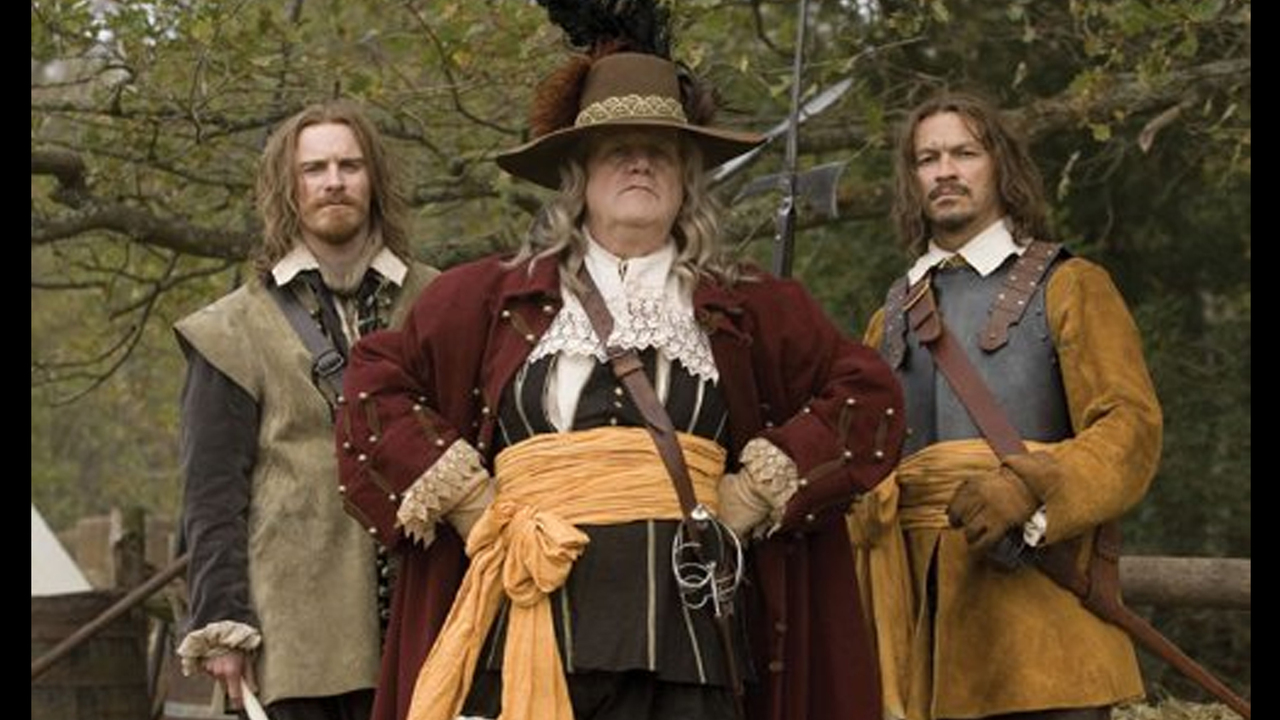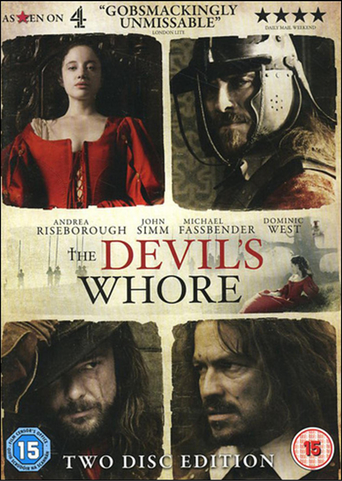

The English Civil War has often been over looked as a subject for drama, with most films being very inaccurate. The Civil War was a important watershed moment in English history, showing a king can be overthrown, strengthen Parliament, reformed the English army and in the end limits power the power of kings and a tyrant. The Devil's Whore is also a new step for Channel Four, because they don't normally make costume dramas (BBC normally makes them). Channel Four focus has often been documentaries, buying good American programmes, and make comedy series like Peep Show and the Inbetweeners.The Devil's Whore has a similar approach to Rome, focusing on a fictional character who becomes involved in historical events and meets famous historical people.The focus of the programme is on Angelica Fanshawe (Andrea Riseborough), an aristocratic woman from a Catholic background. She has rejected God and sees the Devil because her mother ran off to become a nun. The show starts off with Angelica being a member of the Queen's household just before the English Civil War. But as the Civil War starts and Angelica is forced out King Charles I's camp she allies her herself with political radicals like the Levellers. She also falls in love with soldier and political radical Edward Sexby (John Sims). Angelica also gets very close to honest John Lilburne (Tom Goodman-Hill), a popular political radical, and she acts as his champion to Charles I (Peter Capaldi) and Oliver Cromwell (Dominic West).If you are excepting an action-packed war drama, you will be disappointed because they are few battle scenes. But there is some good sword fights which are more realistic then others in visual media. The strength of the show is the character drama, about Angelica and her struggles. The other main strength is the political background, from Charles I's struggles to Parliament, to Oliver Cromwell becoming no more then a military dictator. The history is actuate for the most part, for example, in English culture some people like to idealise Oliver Cromwell as a great liberator: in real life he took over through a military coup, oppressed dissenting voices and enforced his puritan views on the nation, as well being a butcher to Irish Catholics in Drogheda and Wexford.They is a excellent cast, having talented actors like John Sim, Dominic West, Michael Fassbender and Peter Capaldi (who I was particularly impressed with). Anglea Riseborough is a strong newcomer, who is able to hold her own with all these talented people. She turns her character from a lost young woman to a powerful voice of dissent. John Sim, Dominic West, Tom Goodman-Hill and Maxine Peake are also very good in their roles. The production values were excellent, and with a budget of £7 Million, it was put to good use. The set designer and historical scenes were created really well, showing that towns, cities and even important building like Parliament were not very grant. They was an earthy feel to show. Marc Munden was a good director, able to combine all the elements together. He gets the best out of his actors and does some good scenes. He makes the violence realistic and characters like Sexby were heavily scared.This show was not perfect, they were some problems. Some of the subplots did not lead anywhere, the surreal elements did not work for me, especially because of the realistic sitting, and there were historical inaccuracies, such as the omissions of characters like John Pym and Sir Thomas Fairfax. But the programme does show the complex political background with the different schools of thought during the mid-17th century.It is worthy viewing.
... View MoreI can't believe that I know so little about the English Civil War and this series has stimulated me to learn more. The characters were portrayed so well that I feel I want to know so much more about those who were real people. John Simm's performance as Edward Sexby haunts me because he spent so much time longing for a relationship with Angelica, then finally reached his goal, only to move away from her again towards another greater goal. It was inspiring, and I was captivated by the visual impact and the political power of the plot. Like the West Wing, the Devil's Whore managed to make me interested in political issues that may seem dull elsewhere. Oliver Cromwell came across as a real man and most of the real historical figures were 3-dimensional. Angelica was fascinating and powerful, and it doesn't matter that she was not real historically - she held the story together. The details of the struggle between the monarch and the parliamentarians is very gripping and is at the roots of our present system of democracy - probably the model for all democracies. As a Quaker, I need to know as much as possible about this period in English history, because out of the many religious and political groups which grew up in the turbulence of the 17th century, the Society of Friends is one that has survived adapted to modern life - something that the Ranters and Levellers were unable to do.Overall, my main impression was one of fascination with the story of Angelica's life and Sexby's devotion to her - it was a great inspiring tale. Such a shame that it had to be cut down from 12 episodes to 4 - how much more would we have gained if we could have seen all that was planned?
... View MoreAn extremely-engaging and well-acted drama about the period 1642-1660 covering the English Civil War and the subsequent execution of King Charles I and his replacement with England's only republican government. Whilst the history has been simplified with many important characters left-out, this nonetheless sticks to the history quite well. As with HBO's "Rome" fictional characters are invented and their own stories are told alongside those based on historical fact; some historical incidents are also embellished or altered slightly to make them more dramatic.Screenwriter Peter Flannery focuses on the politics of the wars for much of the time and helps scotch the myth deliberately built-up in the aftermath of the 1660 restoration that what happened in England was not a revolution but instead a temporary falling-out leading to an "interregnum". It's true that many of the parliamentary forces were never interested in overthrowing the monarchy but events overtook them and they found themselves embroiled in civil strife as radical forces such as the Levellers and the Diggers threatened to overwhelm not just the monarchy but the Parlimentary landed aristocracy. Whilst England was a republic following the King's execution it was no democracy and the conditions that lead to the betrayal of Cromwell's allies and his own rise of near unassailable-power are simplistically but dramatically detailed.The acting was, in general, of a very high quality with the best performances coming from Peter Capaldi as Charles I and Dominic West as Cromwell. Both managed to portray these deeply-flawed men as more than the monstrous caricatures history can present them as. Tellingly, two of the most emotionally engaging moments in the series for me were King Charles, sentenced to death and stripped of his arrogant autocracy, saying goodbye to his children and Cromwell preparing to be installed as Lord Protector talking to his old comrades in arms who had become his honour guard and reflecting on the fact he had betrayed his own revolution.For me, there were only a few flaws with this series. Edward Saxby, whilst well-played by John Simm, often felt like too much of a "modern" man with his tendency to attack what we can now see as inconsistencies on the Cromwellian side. Similarly, Angelica appeared too much of a modern woman and the scene where she addressed a church and told them there was no heaven and hell (something that would probably have seen her attacked by a mob in the 1650s) was slightly farcical. I also felt that the ending was too optimistic. Yes, Angelica had defeated her personal demons but all that her loved ones had fought for remained in tatters with the restoration simply turning the clock back and I felt that this should have been reflecting in a more sombre conclusion.Overall, though, this is a highly-enjoyable piece of historical drama and an excellent introduction to an important and much-misrepresented period of English history.
... View MoreThis is a confusing historical period; the cavaliers were not bad or good the roundheads were not good or bad. Neither was there a single cause - religion, unfair tax and national debt, autocracy and trying to debase parliamentary powers, (sounds like Gordon Brown!!) . Puritains, church of England, Catholics, Levellers the causes were numerous. Nor can we say it was aristocracy against common people. In the end Oliver Cromwell had his head cut of his dead body, and the people welcomed back Charles II with open arms.This series is very pretty, but it is going to fast to set up the story properly. If you want to see a period romp, it may be enjoyable. If you want to learn about history and the lessons we can learn today from it, read a good book.
... View More